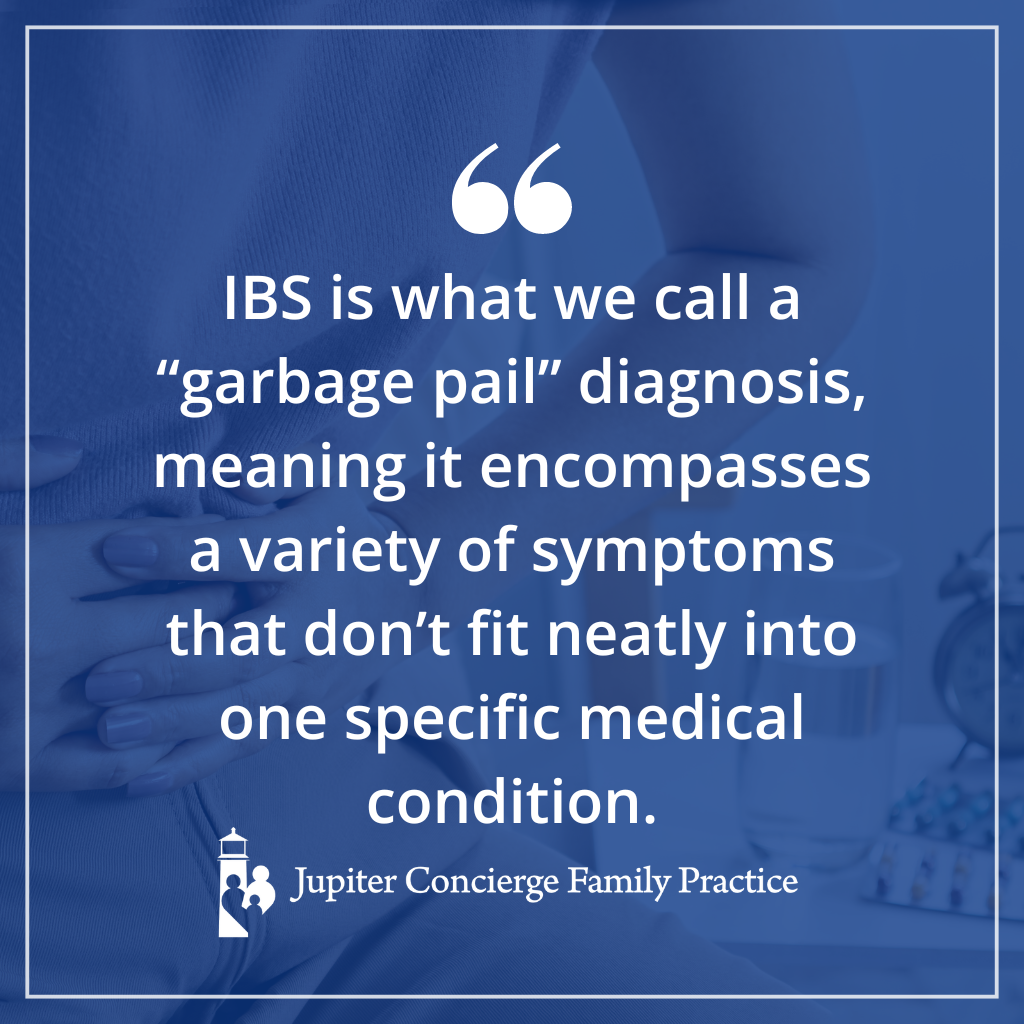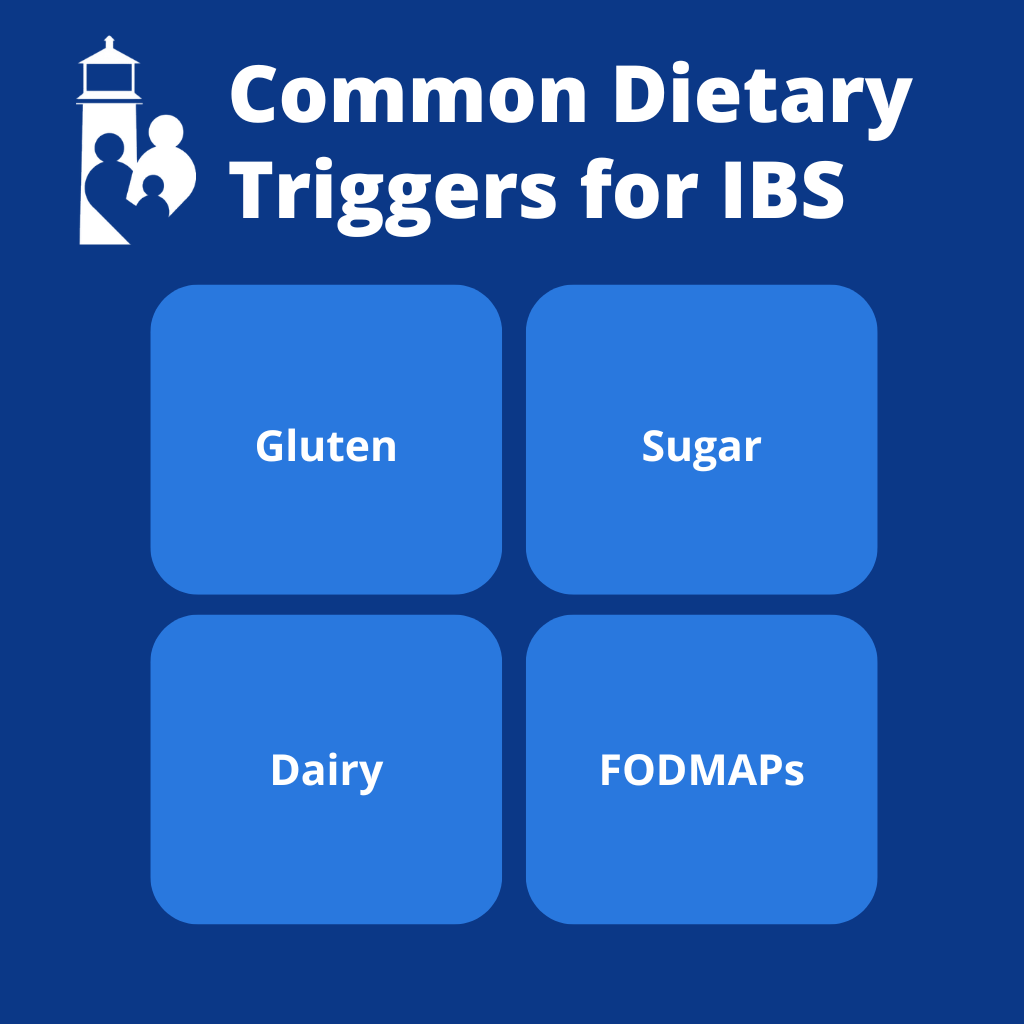
Irritable bowel syndrome (IBS) is one of the most common gastrointestinal conditions in the U.S., and it causes a lot of frustration for millions of people. Patients deal with symptoms like persistent bloating, gas, stomach discomfort, and/or irregular bowel movements with few answers and little relief.
What I want to offer here is a simple yet functional approach to understanding this often nebulous condition and share some strategies for proactive irritable bowel syndrome self-care.
What Is Irritable Bowel Syndrome?
At its core, irritable bowel syndrome is a collection of symptoms that include abdominal pain, bloating, and changes in bowel habits, such as diarrhea or constipation. IBS is what we call a “garbage pail” diagnosis, meaning it encompasses a variety of symptoms that don’t fit neatly into one specific medical condition.
Unlike inflammatory bowel disease (IBD), which includes conditions like Crohn’s disease and ulcerative colitis, IBS doesn’t cause permanent damage to the intestines. It’s a condition of disheartening discomfort rather than long-term injury, but it still affects people’s lives significantly.

The exact causes of IBS aren’t fully understood, but we know they involve factors like:
- Inflammation of the gut
- Imbalances in the gut microbiome (the good and bad bacteria in your intestines)
- Poor digestion leading to excess gas production
- “Leaky gut” syndrome (your intestine allows substances to pass through that shouldn’t)
Common Dietary Triggers for IBS
When a patient comes to me with symptoms suggestive of IBS, the first step we take is to create a diary of their diet. Keeping a food diary helps illuminate patterns that link certain foods to specific symptoms. In my experience, the three most common culprits are sugar, gluten, and dairy:
- Sugar: Processed carbohydrates, especially sugars, are highly inflammatory. They promote the production of excess gas and contribute to the uncomfortable bloating many people with IBS experience.
- Gluten: A popular protein found in wheat, gluten is a major player in gut irritation. Even for those who don’t have celiac disease, gluten may be difficult to digest and promote inflammation.
- Dairy: After age two, most of us lose the ability to properly digest a protein in dairy called casein, leading to symptoms like gas, bloating, and stomach cramps. Dairy intolerance is quite common in IBS patients, and eliminating it may bring significant relief.
The most straightforward approach to irritable bowel syndrome self-care is to try eliminating these foods and seeing if your symptoms improve. Unfortunately, sugar, gluten, and dairy hide in many processed foods, sometimes under obscure names, making this a tricky trial-and-error process.
Stress and Irritable Bowel Syndrome Self-Care
Another major — and often overlooked factor — in irritable bowel syndrome self-care is stress, which can worsen IBS symptoms in multiple ways.
When we’re stressed, our sympathetic nervous system, which is responsible for the “fight or flight” response, kicks in and interferes with our “rest and digest” parasympathetic system. Essentially, stress shuts down proper digestion, making it difficult for the body to process food efficiently.
Three primary types of stress can impact IBS:
- Emotional / Spiritual Stress: This is the type of stress most of us think of: work stress, personal challenges, etc. When we eat in a stressed state, our bodies can’t properly digest and absorb the food.
- Food Stress: I mentioned sugar, gluten, and dairy already, but other foods can trigger stress responses in the body as well. These foods are often high in fermentable carbohydrates, also known as FODMAPs (fermentable oligosaccharides, disaccharides, monosaccharides, and polyols). Examples include garlic, onions, and beans — foods that are healthy foods for most people, but that cause digestive difficulties for those with IBS.
- Hidden Stress: Sometimes, underlying conditions like undiagnosed diabetes or bacterial overgrowth in the gut contribute to IBS. Heavy metal toxins and other environmental stressors can also play a role. Identifying and eliminating these hidden stressors is key to managing IBS long-term.
To prevent stress from triggering irritable bowel syndrome symptoms, I recommend self-care in the form of stress elimination. Take stock of your personal triggers, and then take proactive steps to eliminate them where possible. For example, you might eat your meals in a more relaxed setting, or carve out time to decompress from a busy day.
Of course, no one can eliminate all stress, so finding small ways to shift your mindset and practice self-care related to inevitable stressors can make a significant difference in how your body responds. Actively delegating tasks at work, for example, can ease job stress. Taking up an enjoyable hobby, exercising regularly, or learning a simple meditation technique may also offer relief.
Elimination Diets and IBS Self-Care
Ultimately, one of the most effective ways to manage IBS is through an elimination diet. Removing potential triggers from your diet — whether it’s sugar, gluten, dairy, or FODMAPs — and then systematically reintroducing them allows you to identify exactly what’s causing your symptoms.
Elimination diets can take time to show results — up to three or four weeks — because inflammation lingers even after you remove its trigger. Once your body has a chance to heal, you should see symptoms resolve so you can start over with a blank slate.
The Institute for Functional Medicine (IFM) offers excellent resources on elimination diets, including low-FODMAP plans like this one. I also find that the support and guidance of a knowledgeable dietitian helps to make elimination diets far less difficult and more practical.
Help for When You Can’t Avoid Symptoms
While my philosophy generally leans toward finding and addressing root causes rather than throwing pills at symptoms, I also realize that symptom relief is necessary at times.
When you can’t avoid your triggers or if you haven’t identified them yet, you might try a few methods of symptom relief:
- Products that contain simethicone, like GasX, can help reduce gas and bloating.
- Lactase enzyme pills like Lactaid can be useful for breaking down lactose in dairy.
- Herbal remedies like ginger can soothe the digestive system and reduce inflammation.
Still, the best long-term approach to healthy irritable bowel syndrome self-care lies in removing irritants and addressing root causes.
Besides stress and dietary triggers, functional medicine testing can help identify behind-the-scenes culprits like bacterial overgrowth or digestive imbalances. If you’re not producing enough stomach acid, for example, your ability to break down food properly could be impaired, leading to bloating and discomfort.
Take a Proactive Approach to IBS Self-Care
IBS can be frustrating, but it doesn’t have to be debilitating. By taking a holistic, proactive approach to irritable bowel syndrome self-care — through mindful dietary changes, stress management, and addressing the root causes — you can start to regain control of your digestive health.
And remember, you don’t have to do it alone. Bring symptoms up with your doctor, take advantage of online resources, and seek out knowledgeable professionals who will support you as you look for answers.
I encourage any of my patients dealing with persistent IBS symptoms to reach out and start a discussion. We’ll work together to get to the bottom of it!

Dr. David Rosenberg
Dr. Rosenberg is a board-certified Family Physician. He received his medical degree from the University of Miami in 1988 and completed his residency in Family Medicine at The Washington Hospital in Washington, Pennsylvania in 1991. After practicing Emergency Medicine at Palm Beach Gardens Medical Center for two years, he started private practice in Jupiter, in 1993. He is an avid baseball fan and Beatles fanatic, since he was 8 years old. He has been married to his wife, Mary, since 1985 and has three grown children.
David completed additional studies at Mercer University, Macon, Georgia and obtained a BS in Chemistry in 1983.
“My interests include tennis, snow skiing, Pilates and self-development.”

